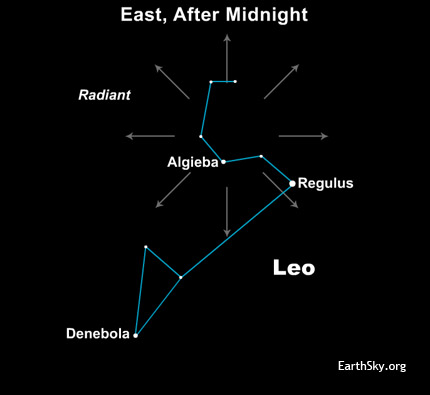Science
Related: About this forumAll you need to know: 2020's Leonid meteor shower (earthsky.org)
Posted by Deborah Byrd in Astronomy Essentials | November 14, 2020
2020’s Leonid meteor shower is expected to peak on the morning of November 17, during the dark hours before dawn. Charts, tips and details here.
November’s wonderful Leonid meteor shower is active from about November 6 to 30 each year. The peak is expected in 2020 on the morning of November 17. The shower happens as our world crosses the orbital path of Comet 55P/Tempel-Tuttle. Like many comets, Tempel-Tuttle litters its orbit with bits of debris. It’s when this cometary debris enters Earth’s atmosphere and vaporizes that we see the Leonid meteor shower. In 2020, the moon – in a waxing crescent phase – will set in early evening, to provide moon-free skies after midnight when the most meteors typically fall. In a dark sky, with no moon, you can see up to 10 to 15 meteors per hour at the peak.
Although this shower is known for its periodic storms, no Leonid storm is expected this year. Keep reading to learn more.
How many Leonid meteors will you see in 2020? The answer always depends on when you watch, where you watch, and on the clarity and darkness of your night sky.
In 2020, we are lucky to have the waxing crescent moon set by early evening, to provide dark skies for this year’s Leonid meteor shower. So you might see as many as 10 to 15 meteors per hour during the dark hours before dawn.

***
more: https://earthsky.org/astronomy-essentials/everything-you-need-to-know-leonid-meteor-shower
underpants
(182,630 posts)or at least some better hours.
Just saying b
SCantiGOP
(13,866 posts)I don’t know why they didn’t reschedule it to a Saturday so more people could watch it. ![]()
NRaleighLiberal
(60,007 posts)drove to an area near a lake, pitch black sky (we were in Raleigh at the time) - wasn't sure what to expect - but by 2 PM or so it looked like we were in a big car driving through snow - a few thousand per hour was the rate. Looking at the Leonid forecasts, no more storms of that magnitude will occur again in my lifetime.
10-15 per hour means one every few minutes - of course they are really cool to observe....but, my, that storm!
Anyone else at DU catch that remarkable event?
By the way, here is a paper with hourly rate predictions to the year 2100. 2027, 2034, 2035, 2043 are all supposed to be better than typical (beyond that I will be long gone, but you can check the data here
http://adsabs.harvard.edu/full/2007JIMO...35....5M#:~:text=In%202019%20an%20average%20traditional,will%20be%20considerably%20above%20average.